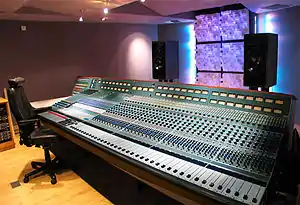Rupert Neve
Rupert Neve, born 31 July 1926 in Newton Abbot, England,[1] is a British electronics engineer and entrepreneur, who is particularly known as a pioneering designer of professional audio recording equipment.
Overview
Neve is known for his work on microphone preamplifiers, equalizers, compressors and early large format mixing consoles. Many of his long discontinued products are considered classic equipment and are very highly sought after by the professionals in the recording industry.[2] This has resulted in several companies releasing products that are Neve replicas or clones. He is often credited as the man who made the recording console.[3] In 1989 he became an inducted member of the Mix Hall of Fame,[4] and in 1997 he was the third person to receive a Technical Grammy Award.[5] In a 1999 survey conducted by Studio Sound magazine he was selected by his peers as the number one audio personality of the 20th century.[6] Dave Grohl has interviewed him in 2013 documentary Sound City.
Biography
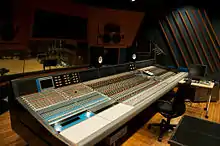
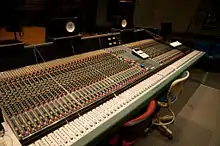
Rupert Neve was born a British national although he spent much of his early childhood in Buenos Aires, Argentina, where his father was an agent for the British and Foreign Bible Society.[1] He began designing audio amplifiers and radio receivers from age 13. The start of World War II increased demand for radios and Neve began repairing and selling radios. At 17 years of age he volunteered as a sailor for the British navy and soon after settled in England where he built a mobile recording studio in which he recorded choirs, operas, and public addresses.
In the 1950s, Neve worked for Rediffusion, primarily a forerunner in early cable TV systems. Neve left the company, and formed CQ Audio, a company specialising in the manufacture of hifi speaker systems. In the early 1960s, he designed and built a mixing console for a composer named Desmond Leslie, from Castle Leslie, Ireland, where the original desk is still housed. In 1961, he formed Neve Electronics.[7]
In 1964, Neve built a transistor-based mixing console with an equalizer for Phillips Recording Studio in London.[7][8] As demand for consoles increased, Neve started a life of manufacturing and designing audio recording equipment. Neve has founded or been involved with several companies (listed below), most recently Rupert Neve Designs, based in Wimberley, Texas, United States, where he has resided with his wife Evelyn since they became U.S. citizens in 2002.[1]
In 2008, the Neve buildings in Melbourn were demolished to make way for a housing development by Camstead Homes. Originally marketed under the name Foxfields,[9] the completed development was named Rupert Neve Close.
Companies associated or affiliated with Rupert Neve
Neve

Neve's first company was a manufacturer of high end recording consoles in England. It was originally operated out of Neve's home, and moved to its own premises in the late 1960s. It was sold in 1973 to Bonochord Group of companies and Rupert Neve left the company in 1975.[10]
AMS Neve
The original Neve group was sold to Siemens in 1985. Siemens then merged Neve with another UK audio console manufacture AMS (Advanced Music Systems) and formed AMS Neve. After the merger, Siemens closed down the Neve production facility and moved all production to AMS's Burnley facility. Many of the original Neve staff made the move to Burnley and continue to work at AMS Neve. AMS Neve now hold the intellectual property rights to all products designed by Rupert Neve during his ownership of the Neve group.
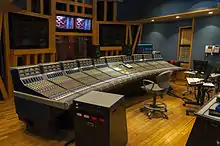
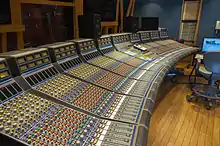
Focusrite
The company made outboard gear, mainly dynamic processors and equalizers. The company was liquidated in 1989. Phil Dudderidge, who incorporated a new company Focusrite Audio Engineering Ltd, bought the assets of Focusrite Ltd. He still sells the Focusrite Ltd designed products designed by Neve. Neve has not designed any products for the Focusrite brand name since he sold the company.[11]
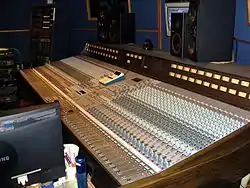
.jpg.webp)
Amek
ARN Consultants helped Amek design Consoles.[11]
Taylor Guitars
ARN consultants helped to design the ES pickup system for Taylor's acoustic guitars. Rupert also designed the K4 preamplifier for Taylor.[12][13][14]
Legendary Audio
ARN Consultants designed the 2-channel mastering box, the Masterpiece.
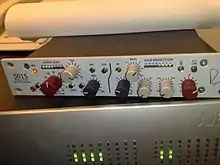
Rupert Neve Designs
ARN Consultants currently trades under this name. Rupert Neve Designs markets a variety of microphone preamplifiers, equalizers, compressors, and other recording equipment. Rupert Neve Designs also manufactures a line mixer, the 5088.[15]
sE Electronics
Rupert Neve partnered with sE to design a "Rupert Neve Signature Series" of microphones. As of April 2015, three models have been introduced: the RNR1 active ribbon microphone, the RN17 small-diaphragm condenser microphone, and the RNT large-diaphragm vacuum tube condenser microphone.[16]
References
- "Mr. Rupert Neve Achieves a New Milestone". rupertneve.com. 15 August 2006. Archived from the original on 15 September 2013. Retrieved 9 May 2018.
- "About Us". ams-neve.com. Retrieved 9 May 2018.
- "AES New York 2005 Press Release - Rupert Neve - 119th AES Convention Keynote Speaker". Aes.org. Retrieved 8 December 2012.
- "Rupert Neve Designs – Honors". rupertneve.com. Retrieved 21 August 2013.
- "Technical GRAMMY Award | Recording Academy". grammy.com. Retrieved 25 August 2018.
- "The Audio Century. 1. Rupert Neve" (PDF). Studio Sound. December 1999. p. 26. Retrieved 25 August 2018.
- "AMS Neve Celebrates 45 years of Innovation, Growth and Technology Leadership". ams-neve.com. 5 October 2006. Archived from the original on 21 August 2013. Retrieved 9 May 2018.
- "1960's. A Designer Emerges". rupertneve.com. Retrieved 8 May 2018.
- "Fox Fields". Camstead.co.uk. Retrieved 23 August 2020.
- "1970's. Automation". rupertneve.com. Retrieved 9 May 2018.
- "1980's. New Directions". Rupertneve.com. Retrieved 9 May 2018.
- Lockwood, Dave (July 2006). "Taylor Guitars K4 Equaliser". Sound on Sound. Cambridge: SOS Publications Group. Retrieved 9 May 2018.
- Petersen, George (1 November 2004). "Taylor Guitars/Rupert Neve Expression System". Mix. New York City: NewBay Media. Retrieved 9 May 2018.
- "Taylor K4 Preamp/EQ, a Review". In2guitar.com. Retrieved 9 May 2018.
- "Rupert Neve Designs". rupertneve.com. Retrieved 22 March 2017.
- "sE Rupert Neve Microphones". Seelectronics.com. Retrieved 15 April 2015.
External links
| Wikimedia Commons has media related to Rupert Neve. |
- Official website

- Rupert Neve at IMDb

- Rupert Neve discography at Discogs
- Rupert Neve NAMM Oral History Interview (2008)
